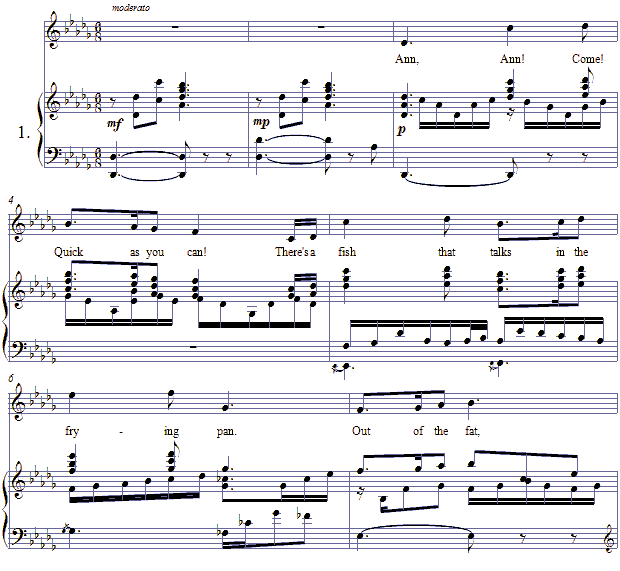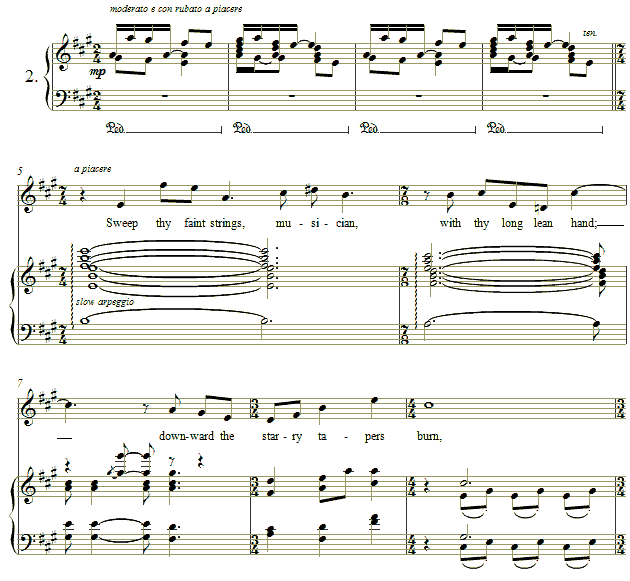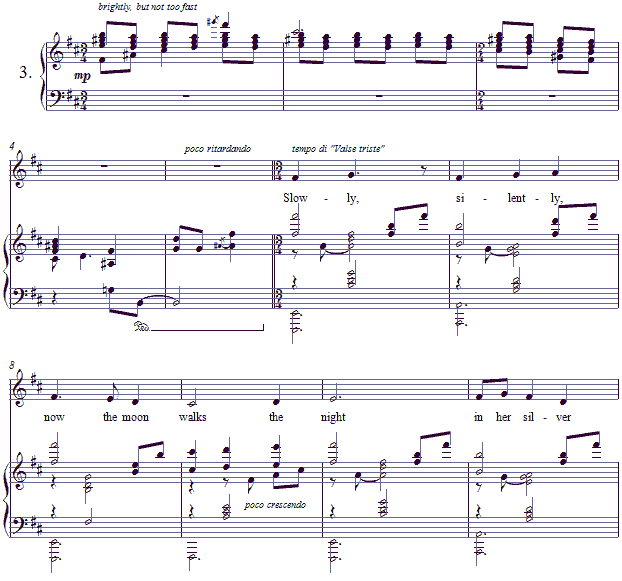Music and Texts of GARY BACHLUND
Vocal Music | Piano | Organ | Chamber Music | Orchestral | Articles and Commentary | Poems and Stories | Miscellany | FAQs
Three Poems of Walter de la Mare - (1985)
Three songs for mezzo soprano and piano
i. Alas, Alack! [ 2 pages, circa 55" ]
Ann, Ann! Come quick as you can!
There's a fish that talks in the frying pan!
Out of the fat, as clear as glass,
He put up his mouth and moaned, "Alas!"
Oh, most mournful 'Alas, alack!'
Then turned to his sizzling, and sank him back.ii. The Song of Shadows [ 3 pages, circa 2' 10" ]
Sweep thy faint strings, Musician,
With thy long, lean hand;
Downward the starry tapers burn,
Sinks soft the waning sand;
The old hound whimpers couched in sleep,
The embers smoulder low;
Across the wall the shadows
Come, and go.
Sweep softly thy strings, Musician,
The minutes mount to hours;
Frost on the windless casement weaves
A labyrinth of flowers;
Ghosts linger in the darkening air,
hearken at the opening door;
Music hath called them, dreaming,
Home once more.iii. Silver [ 4 pages, circa 2' 15" ]
Slowly, silently, now the moon
Walks the night in her silver shoon;
This way, and that, she peers, and sees
Silver fruit upon silver trees;
One by one the casements catch
Her beams beneath the silvery thatch;
Couched in his kennel, like a log,
With paws of silver sleeps the dog;
From their shadowy cote the white breast peep
Of doves in silver-feathered sleep;
A harvest mouse goes scampering by,
With silver claws and a silver eye;
And moveless fish in the water gleam,
By silver reeds in a silver stream.Total duration [ 9 pages, circa 5' 20" ]
Walter de la Mare
Walter de la Mare (1873-1953), British novelist and poet, is loosely connected with the literary tradition of Wordsworth and Coleridge. His career as a writer started in about 1895 and he continued to publish to the end of his life. His first published story, Kismet (1895), appeared in the Sketch under the pseudonym Walter Ramal. De la Mare's reputation as a poet was established by the volume The Listeners and Other Poems (1912). Called a "poet of dusk," De la Mare wrote for both children and adults. His best-known novel is Memoirs of a Midget (1921), which won the James Tait Black Memorial Prize in 1922. In his poems de la Mare has described the English sea and coast, the secret and hidden world of nature. Through his favorite themes, childhood, death, dreams, commonplace objects and events, de la Mare examined with a touch of mystery and often with an undercurrent of melancholy.
These settings for mezzo soprano were sweetly debuted at UCLA by Nicole Baker and pianist Ted Crane, during my time at the university studying education and aesthetics with the delightful Abraham Schwadron and my gentle friend of many years, Maurice Gerow, with whom I had sung for many years as a colleague. With Maurice's retirement and Dr. Schwadron's death occurring about the same time I was given professional contracts for performances at Carnegie Hall and the Metropolitan, I concluded quite rightly that pursuing a degree and subsequent career in music education were not my next steps in life. The music education faculty of UCLA was diminished by their absence.
The three show something of the range of this poet, from the humorous "Alas, alack!' to the more wistful and melancholy side of the poet's oeuvre. In "Alas, alack!' the fish in the frying pan utters its last words, as the sizzle of sixteenth notes runs along beneath the melody line much as the fire under the frying pan.
The more lyrical and melancholy side to de la Mare is shown in this setting of "The Song of the Shadows." The score is noted as "con rubato a piacere," as the performers are encouraged to find their own understanding of the musical gestures, phrasing and interpretation. The subject of the text is music and death, for music -- de la Mare capitalizes both "Musician" and "Music" -- calls us ghosts "home."
The final setting, "Silver," is a arched form or bow, in which the sections are reprised in reverse order -- a - b -c -d - c -b -a -- as seemed to befit the text when I set it. The many repetitions of the word, silver, reflect the moonlight's coloring of a landscape, its details and the creature by which he populates that landscape. Sitting between D major and B minor, the sections of this arch each center on a different yet related tonal region, examining those tonal domains as de la Mare examines his "silver" landscape. Thus the opening gesture's E over F-sharp announces an ambivalence as to the true tonic of the setting, cadencing in B, and preparing the "a" section in D major which does not truly define its tonic. The "b" section teeters towards B minor, while the next sections survey the major and minor dominants of B, the final cadence of the song setting.
The score is available as a free PDF download, though any major commercial performance or recording of the work is prohibited without prior arrangement with the composer. Click on the graphic below for this piano-vocal score.
Three Poems of Walter de la Mare




